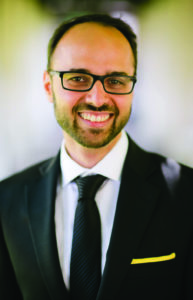
LEXINGTON With many medical specialties now taking a more holistic approach to healthcare, it is not uncommon to place mental and emotional health right alongside physical. However, there is another aspect of well-being that is often ignored—sexual health, especially women’s sexual health.
According to Danesh Mazloomdoost, MD, of Wellward Regenerative Medicine, “Sex is under-prioritized in healthcare. We each have an appetite for sex and a need for intimacy. This is not unlike an appetite for food and a need for nourishment. Think about the measures we take if someone could not eat, but how little priority healthcare places on maintaining healthy sexual function.”
Wellward’s primary mission is to heal physical and mental pain, but the nerves and psychology of sexual function overlap well with soft-tissue and joint regeneration. So Wellward is offering women improved sexual wellness in the form of the O-Shot®, defined by the procedure’s official website, oshot.info, as “a non-surgical procedure that cultivates your body’s own growth factors (platelet rich plasma) for vaginal and clitoral rejuvenation, enhancing your sexual experience.”
Mazloomdoost completed his medical degree and anesthesiology residency at John Hopkins Medical Institute. He went on to pain medicine fellowships at both the prestigious MD Anderson Cancer Center in Houston and did subsequent post-fellowship training in regenerative medicine. Now, as the founder of Wellward Regenerative Medicine, Mazloomdoost serves as both a full-time clinician and administrator.
■ Who is a good candidate for the O-Shot®?
Danesh Mazloomdoost, MD: Anyone who has noticed a decrease in sexual drive or function, or has had stress incontinence (the kind where you cough or sneeze and have a small amount of leakage).
■ Please, briefly describe the procedure.
DM: Blood is drawn to isolate growth factors from the bloodstream in our state-of-the-art lab. The genital area is numbed and two quick injections are made. The entire procedure takes just a few minutes, but the difficult part is only a few seconds.
■ What are the benefits/results?
DM: A lot of people don’t know this, but women have the equivalent of a male erection but on the inside. Similar to men, this organ starts to lose its “sponginess” as we age and becomes less sensitive. This reduces sensitivity during sex and lessens the prevalence and intensity of orgasms.
With this procedure, the body is receiving growth factors in concentrations it normally cannot mount, and therefore responds by regenerating arteries and nerves which restore the sexual function of younger days. An added benefit for women is that these sexually sensitive parts are adjacent to the muscles that control urination. Women who have incontinence from increased abdominal pressure like coughing and sneezing, or just simply getting up from a chair (called stress incontinence) see an improvement and reduction of leakage. While this does not address every form of incontinence, nor is it the only treatment for stress incontinence, it is a minimally invasive, very low risk, often beneficial treatment.
■ Are there any negative side effects?
DM: Done properly, the risks of any regenerative procedure are less than even basic injections or vaccinations. What we are injecting is a concentrate of your own body’s growth factors that circulate in your bloodstream. Infection rates are lower because this concentrate also has a higher number of protective immune cells. Some people are slightly sore afterwards, but a lot of people don’t even notice that and are sexually active later that evening.
■ What other treatments does Wellward offer that are geared toward women?
DM: Estrogen is a necessary hormone, but it softens ligaments, possibly as an evolutionary necessity to childbirth. Even among women who have never had children, the repetitive cycling of estrogen with their menstrual cycle loosens ligaments and makes them prone to injury and subsequent pain. When joints become unstable or loose, the wobble causes pain and can evolve into arthritis, disc problems, headaches, fibromyalgia and many other painful issues. Our main focus is on optimizing joint integrity and managing pain by addressing the root cause. We do so with both conventional and regenerative treatments that are nonsurgical but often beneficial even when surgery is an option.
Wellward Regenerative Medicine’s goal is to “educate patients about their own bodies and guide them on how to optimize their health.” Mazloomdoost elaborates, “The body is constantly regenerating, this is what keeps us alive. Healthcare undervalues this and often takes a reactive approach instead of proactive. Our goal is to change healthcare’s perspective— rather than solely focusing on curing disease, we aim to be the guardians of health and empower patients to not be patients.”
To this end, in addition to their current offerings, this year Wellward will be expanding capacity, adding physicians, and providing new services, including an opioid de-escalation clinic and transitional pain service to help manage patients’ pain during trauma, surgery, or other difficult times.

